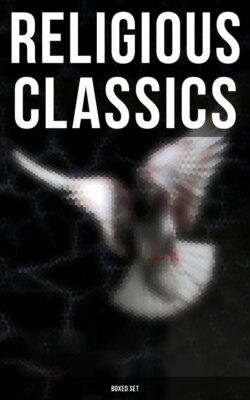Читать книгу Religious Classics - Boxed Set - Джон Мильтон - Страница 144
На сайте Литреса книга снята с продажи.
VI.
The Minister.
ОглавлениеTable of Contents
The king had lost his first minister, and chose Zadig to supply his place. All the ladies in Babylon applauded the choice; for, since the foundation of the empire, there had never been such a young minister. But all the courtiers were filled with jealousy and vexation. The envious man, in particular, was troubled with a spitting of blood, and a prodigious inflammation in his nose. Zadig, having thanked the king and queen for their goodness, went likewise to thank the parrot.
"Beautiful bird," said he, "tis thou that hast saved my life, and made me first minister. The queen's bitch and the king's horse did me a great deal of mischief; but thou hast done me much good. Upon such slender threads as these do the fates of mortals hang! but," added he, "this happiness perhaps will vanish very soon."
The cup.—"May it please your majesty," said Zadig, "thyself alone deservest the cup."
"Soon," replied the parrot.
Zadig was somewhat startled at this word. But as he was a good natural philosopher, and did not believe parrots to be prophets, he quickly recovered his spirits, and resolved to execute his duty to the best of his power.
He made every one feel the sacred authority of the laws, but no one felt the weight of his dignity. He never checked the deliberations of the divan; and every vizier might give his opinion without fear of incurring the minister's displeasure. When he gave judgment, it was not he that gave it; it was the law; the rigor of which, however, whenever it was too severe, he always took care to soften; and when laws were wanting, the equity of his decisions was such as might easily have made them pass for those of Zoroaster.
It is to him that the nations are indebted for this grand principle, to wit, that it is better to run the risk of sparing the guilty than to condemn the innocent. He imagined that laws were made as well to secure the people from the suffering of injuries as to restrain them from the commission of crimes. His chief talent consisted in discovering the truth, which all men seek to obscure. This great talent he put in practice from the very beginning of his administration.
A famous merchant of Babylon, who died in the Indies, divided his estate equally between his two sons, after having disposed of their sister in marriage, and left a present of thirty thousand pieces of gold to that son who should be found to have loved him best. The eldest raised a tomb to his memory; the youngest increased his sister's portion, by giving her a part of his inheritance. Every one said that the eldest son loved his father best, and the youngest his sister; and that the thirty thousand pieces belonged to the eldest.
Zadig sent for both of them, the one after the other. To the eldest he said:
"Thy father is not dead; but has survived his last illness, and is returning to Babylon."
"God be praised," replied the young man; "but his tomb cost me a considerable sum."
Zadig afterwards repeated the same story to the youngest son.
"God be praised," said he; "I will go and restore to my father all that I have; but I could wish that he would leave my sister what I have given her."
"Thou shalt restore nothing," replied Zadig, "and thou shalt have the thirty thousand pieces, for thou art the son who loves his father best."
A widow, having a young son, and being possessed of a handsome fortune, had given a promise of marriage to two magi; who were both desirous of marrying her.
"I will take for my husband," said she, "the man who can give the best education to my beloved son."
The two magi contended who should bring him up, and the cause was carried before Zadig. Zadig summoned the two magi to attend him.
"What will you teach your pupil?" said he to the first.
"I will teach him," said the doctor, "the eight parts of speech, logic, astrology, pneumatics, what is meant by substance and accident, abstract and concrete, the doctrine of the monades, and the pre-established harmony."
"For my part," said the second, "I will endeavor to give him a sense of justice, and to make him worthy the friendship of good men."
Zadig then cried:
"Whether thou art the child's favorite or not, thou shalt have his mother."
